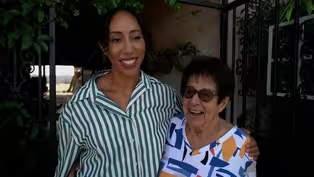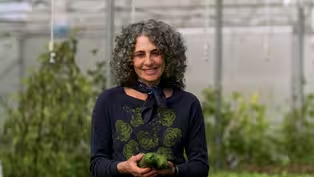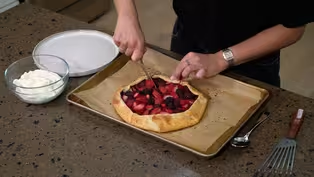
Cultural Roots
Clip: 10/4/2024 | 5m 2sVideo has Closed Captions
Meet a Taiwanese-American farmer inspired by her childhood dishes.
Li Schmidt of Cultural Roots Nursery grows a variety of Asian heritage vegetable starts, and sells the plants at the Sacramento Midtown Farmers Market. The Taiwanese-American farmer was inspired to start the business to connect with her own heritage, and help others do the same.
Problems playing video? | Closed Captioning Feedback
Problems playing video? | Closed Captioning Feedback
America's Heartland is presented by your local public television station.
Funding for America’s Heartland is provided by US Soy, Sustainable Agriculture Research and Education, Rural Development Partners, and a Specialty Crop Grant from the California Department of Food and Agriculture.

Cultural Roots
Clip: 10/4/2024 | 5m 2sVideo has Closed Captions
Li Schmidt of Cultural Roots Nursery grows a variety of Asian heritage vegetable starts, and sells the plants at the Sacramento Midtown Farmers Market. The Taiwanese-American farmer was inspired to start the business to connect with her own heritage, and help others do the same.
Problems playing video? | Closed Captioning Feedback
How to Watch America's Heartland
America's Heartland is available to stream on pbs.org and the free PBS App, available on iPhone, Apple TV, Android TV, Android smartphones, Amazon Fire TV, Amazon Fire Tablet, Roku, Samsung Smart TV, and Vizio.
Providing Support for PBS.org
Learn Moreabout PBS online sponsorship(gentle country music) - [Narrator 1] Whether or not we realize it, along with the food we eat comes a story.
Oftentimes, that story has its roots in our culture and plays a critical role in our sense of community.
That's the backbone of this farmer's story.
- I've been farming since I was 24, so it's been about nine years.
I wasn't raised on a farm.
I don't have farming vegetables, at least in my background, and so how I got into it, I think, was honestly through eating.
- [Narrator 1] For Li Schmidt, the Taiwanese American owner of Cultural Roots Nursery, it started as a journey of rediscovering and reconnecting with foods from her own childhood.
- When I was growing up, I ate a lot of Taiwanese food, and I think that that is something that has really influenced me as a farmer.
- [Narrator 1] But as a child, Li remembers being embarrassed by the foods that were part of her culture because they were different from what other kids ate.
- For me, growing food has been a very empowering experience of reclaiming my identity.
I think growing up I did experience a lot of food shaming, right?
Like, at the cafeteria, opening my lunchbox and having people question what I had brought, what my mom had made.
- [Narrator 1] As her interest in farming grew, Li began collecting seeds from fruits and vegetables that were hard to find but familiar from childhood.
She grew plant starts in her backyard, all the while working and learning on nearby farms and gaining a greater awareness of the challenges in our food system.
Then, the pandemic hit.
- I think all of us saw people panic buying food, right?
I think for the first time people were really waking up to the fragility of the current system that we have.
- [Narrator 1] That's when Li realized that she could make a business out of growing plants, and at the same time, provide cultural foods that resonated more deeply with people.
That's when Cultural Roots Nursery was born.
- The mission of my business is to work towards healing the connection between the Asian diaspora and our cultural foods and the way that I do this is through nursery plants.
- [Narrator 1] Li leased a quarter acre plot and rented a greenhouse in Winters, California, a part of the state that gets very hot in the summer, ideal for the more than 35 varieties of subtropical crops she grows.
In the greenhouse, another 150 varieties of seeds play an important role in her business.
- Do you have any other choy?
- We just have this one, but I don't know if you've ever tried tatsoi.
- [Narrator 1] Today, Li is selling her plant starts primarily to home gardeners at the Midtown Farmer's Market in Sacramento, a place where she's found a loyal following of customers who connect with her plants in a powerful way.
- I've had a lot of people talk about, "I haven't seen this plant since I left my home country, "and the last time I ate it, this is what happened."
- Yeah, she has such a great variety of plants, some that I've seen and some that I've never seen before, and kind of to learn where it came from, its background, whether it's Japanese, Taiwanese, Chinese, or even like some Thai spices or Thai basil.
- It's actually, you can use it for stir fry.
- [Narrator 1] In the greenhouse, Li works alongside two apprentices.
Today, Victoria Deal is learning about seeding.
- So we're gonna do one per cell.
- And to put the seed in the soil and come back two days later and see a plant, it's just like, ah, that's really, really exciting.
- [Li] As a farmer now, I strive to be a mentor to the next generation of farmers, specifically as people of color, as women farmers.
- [Narrator 1] Li, who is passionate about food sovereignty and has a master's degree in community development, says she had a hard time finding mentors when she started farming.
That's why another part of her mission is to educate and inspire people to grow food for themselves, connecting to the food system and perhaps their own culture.
- I am mixed race Uchinanchu, which means that I trace my heritage to the main island of Okinawa.
- [Narrator 1] Corey Ruder is the other apprentice here at Cultural Roots Nursery.
- The whole point of Cultural Roots is bringing culturally relevant plants to people, and there is a large population of Okinawans in, like, the Bay Area.
- [Narrator 1] Corey has not only shared these plant starts with the people in her community, but they have shared seeds and stories with her as well.
- That relationship building and that community connection, it has led to some really beautiful things.
- Farming has taught me that anything is possible, you know?
- [Narrator 1] Li Schmidt believes farming can bring communities together.
It can comfort people, help them provide for themselves, and grow a deeper connection to their culture.
Video has Closed Captions
Clip: 10/4/2024 | 5m 57s | Visit a farm led by multiple generations of women. (5m 57s)
Cultural Foods - Harvesting Health
Video has Closed Captions
Clip: 10/4/2024 | 3m 25s | Our health expert explores the nutritional benefits of culturally significant foods like bitter melo (3m 25s)
Mixed Berry Galette - Farm to Fork
Video has Closed Captions
Clip: 10/4/2024 | 5m 2s | Learn how to make a mixed berry galette with mascarpone whipped cream. (5m 2s)
Providing Support for PBS.org
Learn Moreabout PBS online sponsorshipSupport for PBS provided by:
America's Heartland is presented by your local public television station.
Funding for America’s Heartland is provided by US Soy, Sustainable Agriculture Research and Education, Rural Development Partners, and a Specialty Crop Grant from the California Department of Food and Agriculture.


















